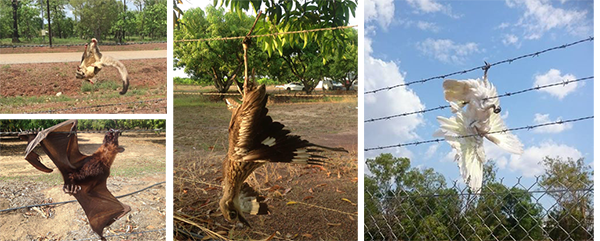Thousands don’t need to die
Many native animals become victims of barbed wire entanglement. Entanglements usually occur when nocturnal animals don’t see fencing or cannot clear the height of the fencing. Over 75 native wildlife species have been recorded as becoming entangled on barbed wire fencing. Especially in the rural area around Humpty Doo our wildlife is dying on barbed wire fences!
Options to save life
There are easy and cost-effective ways to reduce the risk of entanglement. Removal of barbed wire is the most effective however bunting can be applied to the top wire of the fence to make it visible and help animals avoid it. Polytape costs less than 20 cents a meter and reduces entanglement by 95%.
Over 40 fences in and around Darwin are already wildlife friendly, including big parts of the Darwin Airport.
Image: Bunting or flags, markers or tape used for the purpose of making fencing more visible to wildlife.
Wildlife Friendly Fencing is fencing that is safe and effective for wildlife, people and livestock. It
- does not entangle or harm wildlife
- allows the appropriate free movement of wildlife across rural and urban landscapes
- may mean no fence at all.
What you can do
- Monitor barbed wire fencing in your area and report any entangled animals
- Avoid barbed wire
- Use wildlife friendly options
- Replace the top strand of fence with plain or borderline sighter (white plastic coated) wire
- Make existing fence visible at night by using hot tape, bunting or similar
- Consider if a fence is really necessary, consider other options such as planted barriers.
- Avoid erecting fences on ridge-lines, near fruiting or flowering trees, across wildlife corridors, over dams or waterways.
- Remove redundant barbed wire as soon as possible
- Don’t grow fruiting or flowering plants near barbed wire
- NEVER place barbed wire over dams or waterways or nearby.
If you see an animal entangled on barbed wire fencing:
- Report the animal to Wildcare Inc. (08) 8988 6121 or 0408 885 341 or Wildlife Operations, Parks and Wildlife Commission NT (PWCNT) 0401 115 702
- Where possible, leave the rescue to a Wildlife Carer or Wildlife Ranger to reduce the risk of further injury to the animal and to you.
- Whilst waiting for a Wildlife Carer or Wildlife Ranger, reduce stress by providing the animal with shade, keep people – especially children, and other animals away.
- Do not handle bats.


